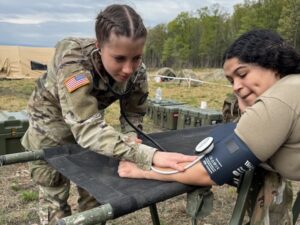
Story by 1st Sgt. HollyAnn Nicom
109th Mobile Public Affairs Detachment
FORT INDIANTOWN GAP, Pa. – Soldiers with the 108th Medical Company Area Support, 213th Regional Support Group, Pennsylvania Army National Guard, trained on setting up an aid station during a field training exercise here, May 2-3, 2025.
The 108th MCAS used the two-day exercise to maintain their readiness and elevate their medical and basic Soldier skills while training in an austere environment. The training included creating a load plan for their supplies, establishing an aid station, setting up communications and practicing various medical-related tasks.
Maj. Kyle Freeman, commander of the 108th MCAS, emphasized the importance of collective training while incorporating a range of realistic scenarios.
“I’m confident that our medics can do all the medical skills because they get tested on those skills every year, so we’re focusing time on our Soldier skills this year,” Freeman said.
Freeman took command of the 108th in August and this was his first FTX with the unit.
“We want to build confidence for our Soldiers so they know they can operate in an austere environment like this,” Freeman said. “If we do deploy, there is a chance that we’ll operate out of a building with running water and flushing toilets and heat and air conditioning, but there is also a chance that we’ll have to set up our tents. I think it’s much more difficult to learn how to set up your tents on the fly in a stressful environment, so we’re figuring it out here in a low-threat environment.”
The exercise is a continuation of the unit’s prior field training over the past few months and is crucial for their plans of a longer stay and more stressful field scenario in July.
1st Sgt. Larry Bergey appreciates the lessons they are learning during their time in the field. With inclement weather plaguing their training site, 108th MCAS Soldiers are experiencing the importance of good tent positioning to combat water run-off. Weather is always a factor when training in a field environment.
“The medicine we do never changes, but the environment that we’re in does,” Bergey said. “We want to have the capability of being proficient in the field as well as in hard-stand buildings, and make sure everyone knows their jobs and are good at them.”
Many Soldiers with the 108th have a large diversity of knowledge, medical careers and life experience which adds a unique element of cohesion to their team skills and adaptability.
“I’m seeing a lot of things that we don’t usually get to do,” said combat medic Spc. Maria Diaz. “We get to practice our combat casualty assessment skills, which deals more in-depth with trauma victims, and I enjoy that because I work as a civilian EMT, and I really don’t see a lot of traumas.”
Despite the adverse weather, Soldiers with the 108th maintained a positive attitude while strengthening their teamwork and building strong bonds as a unit.
“I’m having fun,” Freeman said. “It’s a lot of work, but I think the Soldiers are finding that the more work they do, the more fun that they have.”